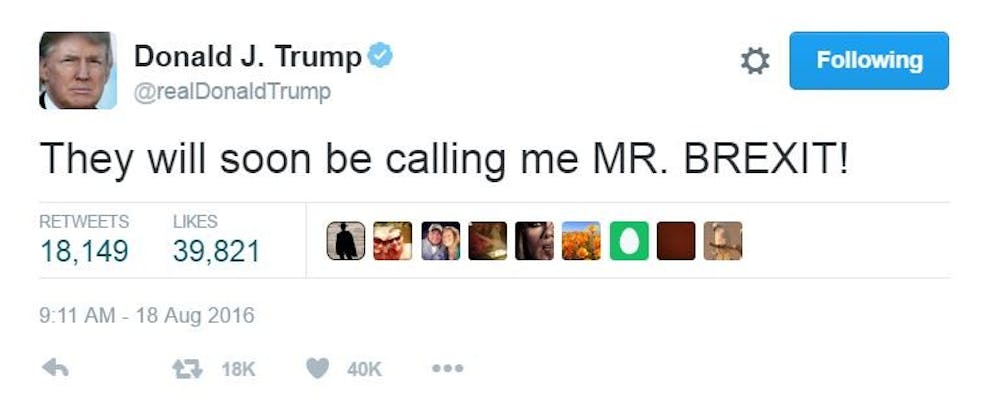America’s “Mr. Brexit” will step into the U.S. presidency Jan. 20, 2017.
Donald Trump’s victory over Democratic opponent Hillary Clinton draws some parallels to the United Kingdom’s decision to leave the European Union, known as Brexit, said Ball State political science professors.
Trump defeated Clinton in the Electoral College 279 to 228, but lost the popular vote 58.8 million to 60.1 million, as of publication time.
“[Trump’s victory and Brexit] represent a populous uprising against an establishment engaged in free trade deals in the past 30 years,” said Joesph Losco, co-director of the Bowen Center for Public Affairs.
In June, voters in the United Kingdom chose to leave the European Union, the economic and political union that facilitates the free movement of people, goods, services and capital in Europe. The word Brexit comes from mashing the words "Britain" and "exit" together.
Votes to “leave” won 52 percent to 48 percent, 17.4 million votes to 16.1 million votes. However, the act of leaving the EU is in progress and tied up in the courts.
Both Brexit and Trump were seen as major upsets because of how they polled before election days.
“[There are] two sides of it — one is the polling side of things, where Trump was not expected to win,” said Sean Hildebrand, a professor of political science. “The polls appeared to be off by about two or three percent. The same thing happened with Brexit.”
Hildebrand also said polling methods and likely voter models will need to be revisited.
“It seems like there is a piece of the voter population that are new voters, not just millennials,” Hildebrand said. “These were voters who were new [or] didn’t always show up and were more likely to vote Trump.”
What’s common between the two countries is the significant portion of the populations that doesn’t feel their governments respond to their needs, Losco said.
“They are mostly old workers left out of the new economy. Most of them were [politically] unengaged until Brexit and Trump,” he said.
In the U.K., the “leave” campaign was seen as the anti-establishment movement and the “remain” campaign as the establishment movement.
Trump himself commended the island nation’s decision to leave the EU, later dubbing himself "Mr. Brexit."
“They will soon be calling me MR. BREXIT!” Trump tweeted Aug. 18.
It’s a title that’s been pinned to prominent “leave” leaders, such as Nigel Farage, leader of the U.K. Independence Party, and Boris Johnson, U.K.’s secretary of state for foreign affairs. Farage appeared on the campaign trail with Trump and expressed support for the president-elect’s campaign.
The day before the election, Trump delivered a pledge to voters at a rally that he’d deliver an upset that would overshadow the British exit from the EU.
“At the ballot box, on Nov. 8, we are going to do something so special. It will be so special. It will be an amazing day. It will be called Brexit plus, plus, plus,” Trump said at the Nov. 7 rally.
A day after the election, Farage said he had passed the mantle of “Mr. Brexit” on to Trump.
“The political revolution of 2016 has been two massive campaigns. The underdogs beat the establishment,” Farage said in a video posted on his Twitter Nov. 9. “We did it in Brexit and Trump did it last night in the U.S.A. And that’s despite the commentators, the media, the established politicians, including in the Republican Party. Most senior Republicans didn’t back Donald Trump and, yet, he did it.”
2016 is the year of political revolution: Brexit in the UK and @realDonaldTrump in the US. pic.twitter.com/WOzS9ZeIYt
— Nigel Farage (@Nigel_Farage) November 9, 2016
Hildebrand thinks that the use of "Mr. Brexit" and "Brexit plus, plus, plus" refers to the inaccuracy of polls and the upset Trump looked to deliver.
There are some differences between Brexit and Trump, however.
“Obviously, they’re completely different animals. One is the European Union and economic [in nature],” Hildebrand said. “The otherside is we’re picking a president, which could take us down that path of nationalism.”
Americans voted for a president, not the severing of economic systems, which could happen with the renegotiation of trade deals, Losco said.
“It’s more domestic and doesn’t change the order of institutions, where Brexit ordered the change of the institutions,” Losco said.
It’s not immediately clear to Losco if it's a brand new world.
“It’s hard to say, there are a lot of people in Trump’s party that disagree with his policies and it’s unclear how far he pushes his party or if he’ll be reined in,” Losco said.





